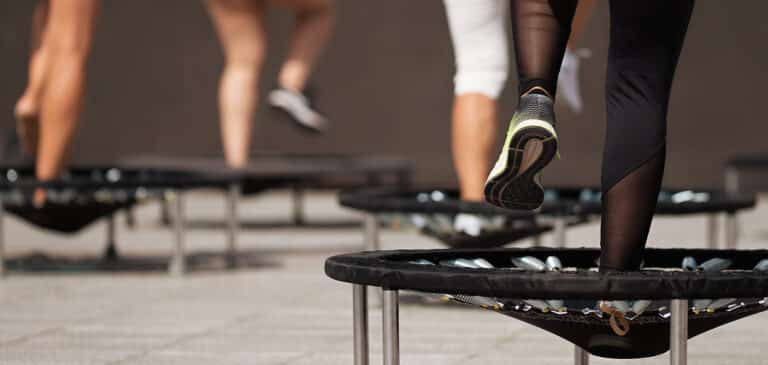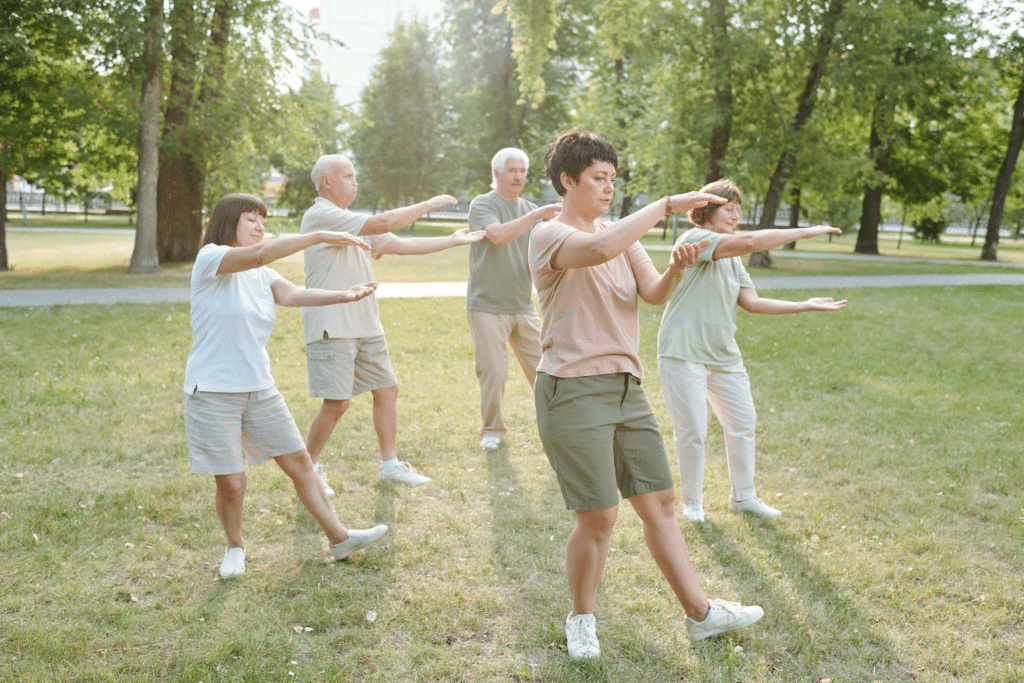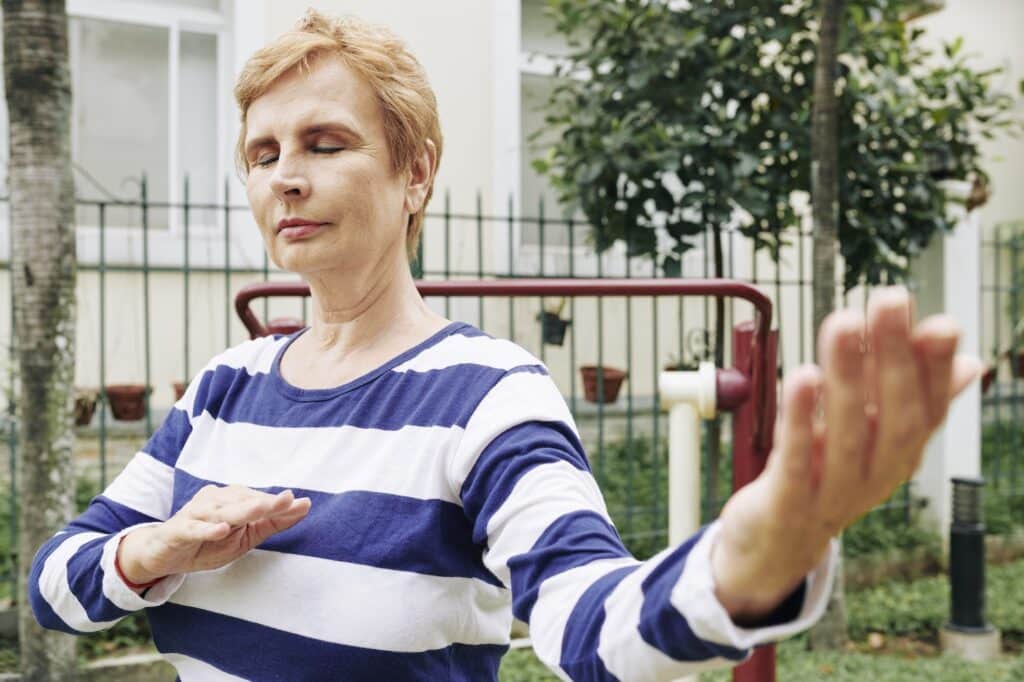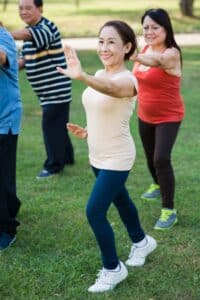

At Physio Ed, we are committed to providing you with trusted and reliable content on health and wellness topics. Our content creation and editing process is rigorous and transparent, and here is how it works:
We value your feedback and questions, and we are always happy to hear from you. You can reach us at info@physioed.com. Thank you for choosing Physio Ed. as your trusted source of health and wellness information.
Are you curious about Qigong? Perhaps you’ve heard that it can improve balance and help to prevent falls, as well as provide a host of other health benefits.
This article will explore the basics of qigong, how it can improve your health and well-being, and how you can get started with a qigong practice at any age.
Qigong (pronounced chee gong – sometimes called Baduanjin qigong) is an ancient practice rooted in traditional Chinese medicine and martial arts.
In the conventional eastern practice, qigong involves the channeling and movement of the body’s vital energy, called the chi or qi. In fact, the root word qi gong literally means energy (qi) and gathering or movement (gong).
Like tai chi or yoga, qigong involves slower, careful movements linked with deliberate breathing techniques. This method is intended to aid in both physical and energetic balance to improve vitality and function.
However, unlike yoga or tai chi, qigong tends to be gentler and involves fewer complex full-body movements. It can also be done either seated or standing – a key benefit for many balance-challenged seniors.
Thanks in part to the gentle, approachable nature of the movements, qigong practitioners do not necessarily need any significant exercise background to begin a practice. As always, we’ll remind you that it’s always best to consult with your doctor.
Let’s take a deeper look at why qigong might be the perfect activity to get you moving, safely.

Many of qigong’s potential benefits may be noticeable relatively quickly. For example, improvements in balance and coordination tend to be some of the first things that qigong practitioners mention.
But there are also a number of positive benefits being explored in research studies ranging from reductions in stress to limiting the effects of major diseases related to old age.
In recent years, research has identified qigong as a safe and approachable mode of exercise for seniors recovering from a variety of conditions, including Parkinson’s, cancer, and even CoVID-19. (1)
While research is ongoing, limited studies have shown benefits for improving nervous system function for those struggling with depression, and improving balance for some Parkinson’s patients.
Like the physical movements in the practice, improvements in other measures like blood pressure and mood disorders have been small but positive, and studies are ongoing to learn more about how qigong may improve lung function for people recovering from CoVID. (1)
Several research studies are currently exploring how qigong might have beneficial effects for a variety of other conditions, like chronic fatigue, cardiovascular diseases, and immune system dysfunction. Note: Many of the profile studies are based in China, where the practice originates. (3)
These practices also typically entail focused attention to breathing regulation, which can have a calming effect on the nervous system, particularly for certain psychological disorders.
One small study even noted that post-traumatic stress disorder (PTSD) patients who practiced qigong regularly reported being more relaxed, with improvements in general mental health and well-being, including decreases in pain and discomfort. (6)
With its careful focus on slow movements linked with breathing techniques, qigong offers stress relief benefits for anxious seniors, office workers, and other stress-prone people. (5)

Most types of physical exercise generally provide gradual improvement in your physical and mental well-being, and qigong is no different.

While access to a local qigong group, teacher, class, or online resource can help any interested person to participate in their first qigong practice, the intended results you are seeking will largely depend on why you decided to try the practice in the first place.
For example, any movement practice that requires full or partial body coordination, like qigong, yoga, tai chi, pilates or other martial arts will gradually improve your balance and agility to a varying degree.
Most of these practices involve movements that you might not do on a daily basis like standing on one foot or making slower-than-usual transitions between movements to build bodily awareness.
However, if you are approaching qigong as a mode of management of chronic pain or some other serious condition, it is important to remember that qigong exercises may help, but no single form of exercise is a “magic bullet.”
With that in mind, if you are suffering from Parkinson’s, cancer, or any of the other conditions we’ve mentioned in this article, consult with your doctor to see if qigong might be a good addition to your regular exercise routine.
Given that it is low-impact and gentle, starting a qigong practice is likely an excellent way to bring some exercise (and stress relief) into your daily life in as little as ten minutes a day. However, the benefits of a qigong program – just like any other exercise program – will take some time.
Physio Ed. offers free Qigong classes right here on our website. Instructor Lynnie Kustal guides you through the practice. Click below to watch!
The health benefits of qigong for seniors are still being researched, but the ancient practice offers a method of mindful movement for the entire body that appears safe for most people, and could potentially offer a variety of important benefits.
Several studies have presented research indicating that we’re just beginning to understand its beneficial effect for those who are suffering from high-risk conditions, chronic pain, or disease.
Thanks to hundreds of years of practice among the people of China and other eastern cultures, we know that qigong is a gentle, low-impact option for newcomers to exercise, especially those who might be recovering from injury or a sedentary lifestyle, or who are just seeking to reduce stress.
Talk to your healthcare provider to find out if qigong will work for your conditions and your lifestyle.
Feng, F., Tuchman, S., Denninger, J. W., Fricchione, G. L., & Yeung, A. (2020). Qigong for the prevention, treatment, and rehabilitation of COVID-19 infection in older adults. The American Journal of Geriatric Psychiatry, 28(8), 812-819.
Chen, S., Zhang, Y., Wang, Y. T., Liu, X., Song, W., & Du, X. (2020). The effect of Qigong-based therapy exercises on patients with Parkinson’s disease: A systematic review and meta-analysis. Clinical Rehabilitation, 34(12), 1436-1448.
Zeng, Y., Xie, X., & Cheng, A. S. (2019). Qigong or Tai Chi in cancer care: an updated systematic review and meta-analysis. Current oncology reports, 21(6), 1-6.
So, W. W. Y., Cai, S., Yau, S. Y., & Tsang, H. W. H. (2019). The neurophysiological and psychological mechanisms of Qigong as a treatment for depression: a systematic review and meta-analysis. Frontiers in Psychiatry, 10, 820.
Larkey, L. K., James, T., Han, S., & James, D. L. (2023). Qigong: Pilot study of Qigong/Tai Chi Easy acute effects of meditative movements, breath focus and “flow” on blood pressure, mood and oxytocin in older adults. Complementary Therapies in Medicine, 102918.
Niles, B. L., Reid, K., Whitworth, J. W., Alligood, E., Williston, S. K., Grossman, D., … & Mori, D. L. (2022). Tai Chi and Qigong for trauma-exposed populations: A systematic review. Mental Health and Physical Activity, 100449.

Keep in mind that we may receive commissions when you click our links and make purchases. However, this does not impact our reviews or recommendations. We prescribe the same equipment to our patients in the clinic. We always try our best to keep things fair and balanced, in order to help you make the best choice for you.